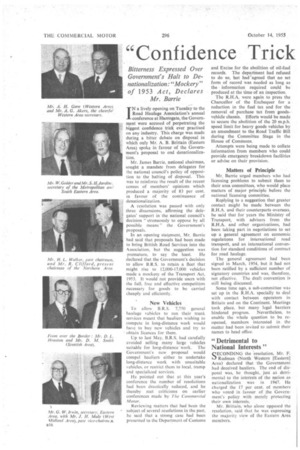"Confidence Trick
Page 50

If you've noticed an error in this article please click here to report it so we can fix it.
Bitterness Expressed Over Government's Halt to Denationalization: "Mockery" of 1953 Act, Declares Mr. Barrie
IN a lively opening on Tuesday to the Road Haulage Association's annual conference at Harrogate, the Government were accused of perpetrating the biggest confidence trick ever practised on any industry. This charge was made during a bitter debate on disposal in which only Mr. A. B. Brittain (Eastern Area) spoke in favour of the Government's proposal to end denationalization,
Mr. James Barrie, national chairman, sought a mandate from delegates for the national council's policy of opposition to the halting of disposal. This was to reinforce the result of the recent census of members' opinions which produced a majority of 83 per cent. in favour of the continnance of denationalization.
A resolution was passed with only three dissensions, affirming the delegates' support in the national council's decision " strenuously to oppose by all possible means" the Government's proposals.
In an opening statement, Mr. Barrie had said that proposals had been made ro bring British Road Services into the Association, but the suggestion was premature, to say the least. He declared that the Government's decision to allow B.R.S. to retain a fleet that might rise to 12,000-17,000 vehicles made a mockery of the Transport Act, 1953. It would not provide users with the full, free and effective competition necessary for goods to be carried cheaply and efficiently.
New Vehicles To allow B.R.S. 7,750 general haulage vehicles to run their trunk services meant that hauliers wishing to compete in long-distance work would have to buy new vehicles and try to obtain licences for them.
Up to last May, B.R.S. had carefully avoided selling many large vehicles suitable for long-distance work. The Government's new proposal would compel hauliers either to undertake long-distance work with unsuitable vehicles, or restrict them to local, tramp and specialized services.
He pointed out that at this year's conference the number of resolutions had been drastically reduced, and he thereby met criticisms on earlier conferences made by The Commercial Motor.
Reviewing matters that had been the subject of several resolutions in the past, he said that a strong case had been presented to the Department of Customs and Excise for the abolition of oil-fuel records. The department had refused to do so, hut had 'agreed that no set form of record was needed as long as the • information required could be produced at the time of an inspection.
The R.H.A. were again to press the Chancellor of the Exchequer for a reduction in the fuel tax and for the removal of purchase tax from goodsvehicle chassis. Efforts would be made to secure the abolition of the 20 m.p.h. speed limit for heavy goods vehicles by an amendment to the Road Traffic Bill during the Committee Stage in the House of Commons.
Attempts were being made to collate information from members who could provide emergency breakdown facilities or advise on their provision.
Matters of Principle Mr. Barrie urged members who had licensing problems to submit .them to their area committees, who would place matters of major principle before the national licensing committee.
Replying to a suggestion that greater contact might be made between the R.H.A. and their counterparts overseas. he said that for years the Ministry of Transport, with advisers from the R.H.A. and other organizations, had been taking part in negotiations to set up a general agreement on economic regulations for international road transport, and an international convention for standard conditions of contract for road haulage.
The general agreement had been signed in March, 1954, but it had not been ratified by a sufficient number of signatory countries and was, therefore, not effective. The draft convention is still being discussed.
Some time ago, a sub-committee was set up in the R.H.A. specially to deal with contact between operators in Britain and on the Continent. Meetings took place, but many legal barriers hindered progress. Nevertheless, to enable the whole question to be reopened, members interested in the matter had been invited to submit their names to head office.
"Detrimental to National Interests"
ECONDING the resolution, Mr. E. h.-3 Rudman (North Western [Eastern] Area) declared that the Government had deceived hauliers. The end of disposal was, he thought, just as detrimental to the interests of the nation as nationalization was in 1947. He charged the 17 per cent. of members who voted in favour of the Government's policy with merely protecting their own interests.
Mr. Brit Lain, who alone opposed the resolution, said that he was expressing the majority view of the Eastern Area members.




















































































































